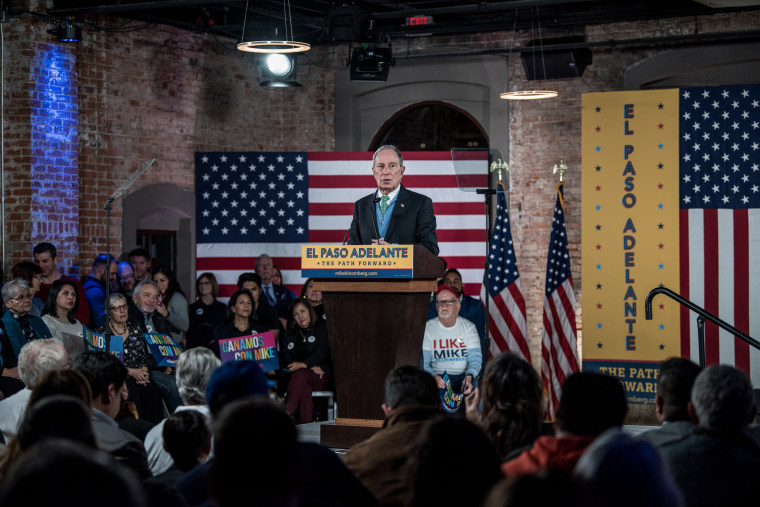Billionaire Democratic presidential candidate Mike Bloomberg plans to spend at least $30 million on direct mail to reach Latino voters in Texas, California and North Carolina, a source close to his campaign told NBC News.
Such spending would set up an expensive contest between Bloomberg and Sen. Bernie Sanders, I-Vt., whose targeting of Latinos appears to have paid off for him in Iowa and Nevada.
The Bloomberg campaign "is reaching out to Latino voters in a variety of ways, including direct mail, advertising and supporter mobilization program," Alejandra Soto, the Bloomberg campaign's national spokesperson, said in a statement in response to an NBC News request regarding the spending plans. "Mike launched the campaign's Ganamos con Mike outreach initiative at the end of January, and the campaign has hosted multiple events in Super Tuesday states."
Larry Gonzalez, a principal in the Democratic lobbying firm Raben Group, said while mailers may not be as effective in the community as door-to-door canvassing or social media, that kind of spending certainly would have impact.
"Let’s compare. Last cycle, the Democratic Party said it was going to spend $25 million on Latinos, so in one fell swoop, he’s spending $30 million," Gonzalez said.
"It doesn’t hurt if you have that kind of money and you are going to spend it," he said.
Mediaite’s Adrian Carrasquillo first reported a spending range of from $20 million to $40 million by the campaign on the direct mail push to Latino voters in the critical states.
Bloomberg, a late entrant into the race, skipped the early contests and is focusing on Super Tuesday next week. That's when 14 states and a U.S. territory — including delegate-rich states such as California, Texas and North Carolina —hold their elections. There are 1,357 delegates at stake on Super Tuesday, with more than half coming from California, Texas and North Carolina.
In an El Paso, Texas, speech last month, Bloomberg outlined his agenda for Latino voters, saying he wanted to provide "security."
"And by 'security,' I don’t mean only physical security," Bloomberg said. "I mean economic security. I mean housing security. I mean the security of knowing your kids will have a quality education, knowing you will be able to afford health care, and knowing you will be safe from climate change — which, make no mistake, is hitting Latinos hard as we’ve seen right here in Texas, not to mention places like Puerto Rico."
He also pledged to "enact comprehensive immigration reform."
"And we will create a path to legalization and citizenship for the 11 million people living in the shadows," he added. "This will be one of the top priorities during my first month in office. And I’ve got to tell you, after too many years of inaction, I want to make it clear: We will get it done."
There is some question whether Bloomberg can get support in communities of color because of his support for New York's stop-and-frisk policy that was disproportionately used by police on black and Latino men to stop them and check whether they were carrying weapons. Bloomberg has apologized for supporting the policy.
In Iowa, Sanders was the preferred candidate of about 52 percent of Latino voters who caucused at 32 precincts with 35 percent or higher Latino populations, according to an analysis by University of California Los Angeles’ Latino Policy and Politics Initiative. Meanwhile, in Nevada, entrance polls showed Sanders winning 51 percent of Hispanics. An analysis by UCLA’s Latino Policy and Politics Initiative showed Sanders won 74 percent of the vote in majority Latino precincts in the state.
The direct mail spending would be part of record sums that Bloomberg has spent on his nascent campaign, bolstering the effort with roughly half a billion spent on advertising so far.
Sanders’ strength with Latinos can be traced to outreach beginning many months back, going not only to consistent and regular voters but also to new voters and those without a consistent voting record.
An analysis of Latino campaign contributions in the Democratic primary showed Sanders has raised the most from Latinos, about $8.3 million last year.
Bloomberg is self-funding his candidacy. In a recent Univision poll, Bloomberg was the top choice for 18 percent of Latino Democrats surveyed nationally, putting him in a virtual tie with former Vice President Joe Biden for second place. Both men trailed Sanders.
Follow NBC Latino on Facebook, Twitter and Instagram.


